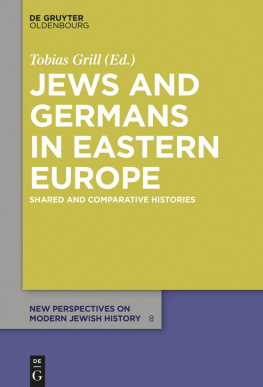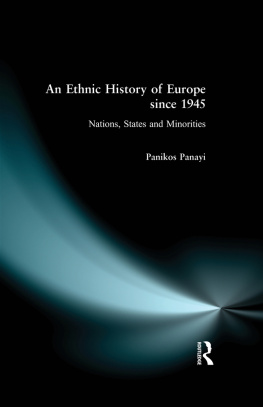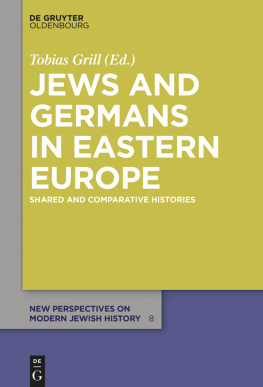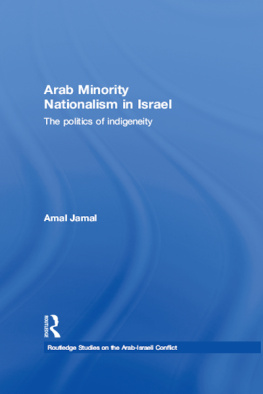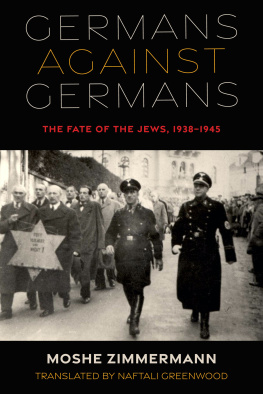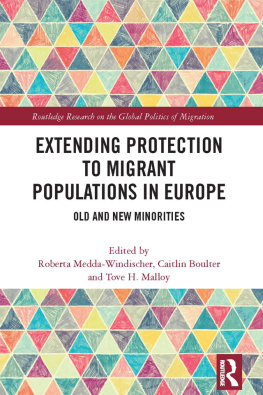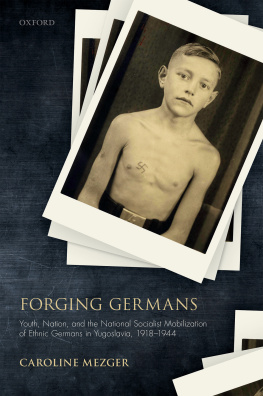GERMANS AS MINORITIES DURING THE FIRST WORLD WAR
Germans as Minorities during the First World War
A Global Comparative Perspective
Edited by
PANIKOS PANAYI
De Montfort University, UK
First published 2014 by Ashgate Publishing
Published 2016 by Routledge
2 Park Square, Milton Park, Abingdon, Oxon OX14 4RN
711 Third Avenue, New York, NY 10017, USA
Routledge is an imprint of the Taylor & Francis Group, an informa business
Copyright Panikos Panayi 2014
Panikos Panayi has asserted his right under the Copyright, Designs and Patents Act, 1988, to be identified as the editor of this work.
All rights reserved. No part of this book may be reprinted or reproduced or utilised in any form or by any electronic, mechanical, or other means, now known or hereafter invented, including photocopying and recording, or in any information storage or retrieval system, without permission in writing from the publishers.
Notice:
Product or corporate names may be trademarks or registered trademarks, and are used only for identification and explanation without intent to infringe.
British Library Cataloguing in Publication Data
A catalogue record for this book is available from the British Library
The Library of Congress has cataloged the printed edition as follows:
Germans as Minorities during the First World WarGlobal Comparative Perspective / edited by Panikos Panayi.
pages cm
Includes bibliographical references and index.
1. Germans Foreign countries Social conditions 20th century. 2. World War, 1914-1918 Social aspects. 3. Minorities Social conditions 20th century. 4. Racism History 20th century. 5. Race discrimination History 20th century.
I. Panayi, Panikos, editor of compilation author.
D524.6.G47 2014
940.308931dc23
2013043326
ISBN 9781409455646 (hbk)
ISBN 9781315584645 (ebk-PDF)
ISBN 9781317128403 (ebk-ePUB)
Contents
Panikos Panayi
Stefan Manz
Matthew Stibbe
Zo Denness
Panikos Panayi
Frank Caestecker and Antoon Vrints
Daniela L. Caglioti
Dittmar Dahlmann
Malte Fuhrmann
Tammy M. Proctor
Tilman Dedering
Daniel Steinbach
Andrew Francis
Preface
The book has had a long period of gestation, originating in an international colloquium at Villa Vigoni near Lake Maggiore on German Merchant and Entrepreneurial Migration (17501920), which took place in November 2008, where several of the contributors met each other. They then convened again at a panel at the European Social Science History Conference in Ghent on 16 April 2010 on the experiences of German minorities during the First World War. Most importantly, all of the essays, except that of Matthew Stibbe (who attended as a commentator), were presented at an international colloquium held at De Montfort University in the summer of 2011. The event involved drafts of the papers presented by each contributor, with the aim of feedback for improvement for publication. Each contributor submitted their piece in advance of the meeting.
The current volume brings together the leading scholars in their field to examine the experiences of German minorities during the First World War. In particular, building upon their own previous knowledge and research, the team has examined a series of key issues in their own essays, which include the following. First, to what extent did an established German community exist before the outbreak of the First World War and did it survive the conflict? Second, how did public opinion in the form of the press, parliament and ordinary citizens react towards the presence of German enemy aliens in their midst? Third, how did governments treat their German populations during the First World War? Fourth, why did nation states and their populations throughout the world behave in a similarly intolerant manner towards Germans in their midst? Was World War One a significant turning point in the evolution of nationalism and xenophobia? Was there a copycat element among both state behaviour and the attitudes of populations towards Germans throughout the world from New Zealand to Russia? Finally, using the example of the experience of Germans, can we regard the First World War as a turning point in the mistreatment of minorities, which would lead to the even worse manifestations of racism which peaked between 1939 and 1945?
The book is divided into two sections. The first contains introductory essays, setting the context, while Section Two contains individual case studies. The first essay, by Panikos Panayi, tackles the theme of Germans as Minorities during the First World War: Global Comparative Perspectives. This begins with an outline of the German diaspora before the First World War and then moves on to examine the experiences of German minorities on a global scale, outlining patterns of exclusion but also demonstrating that those of German origin played a role in the war efforts of the nation states in which they lived. The essay makes global comparisons and points to similarities before offering explanations for the overwhelmingly negative experiences of German minorities during the Great War.
There then follows an essay by Stefan Manz on Diaspora and Weltpolitik in Wilhelmine Germany, which begins with an overview of the main destinations and types of migration. Germans found themselves in a multitude of different settings, creating hybrid identities and different host-minority relationships. The internal cohesion of ethnic communities was limited due to persisting regional, religious, political and class affiliations. In public discourse, however, as the second part of the essay will show, they were increasingly represented as outposts of a Greater German Empire whose ethnic links with the mother country had to be preserved for their own and the empires benefits. Germans worldwide underwent a redefinition from geographically scattered and disparate groups to an ostensibly unified transnational community of spirit. The essay argues that this discourse did, indeed, have an impact on migrants sense of national belonging and ethnic identity. By 1914 a Reich-focused diaspora nationalism was apparent in many communities. Increasing flows of transnational communication allowed for migrants to become involved in day-to-day politics and support Reich-policies such as its ambitious naval programme. The global presence of Germans now acted as a catalyst to spread disputes between European powers into all parts of the world. The scene was set for the confrontational ways in which host societies and their German minorities interacted during the First World War.
Matthew Stibbe on The German Empires Response: From Retaliation to the Painful Realities of Defeat examines Germanys response to the internment and expulsion measures taken by enemy nations worldwide against its subjects during and immediately after the First World War. Its primary focus is on official German state policy and associated anti-Allied, especially anti-British, propaganda. The main argument will be that the German governments inability to do much to safeguard the interests of its civilian subjects in enemy captivity, whether in the form of material relief, prisoner exchanges or meaningful retaliation against enemy aliens at home, underlined the fact that, in the global economic war, all the cards were stacked in Britains favour. In particular, the internment of around 4000 British subjects in Ruhleben camp in November 1914 proved to be a costly and self-defeating policy, failing to deter instances of anti-German rioting in several parts of the world in May 1915 and to halt the move towards wholesale internment of Germans in Britain at around the same time. The German decision to intern British and Allied civilians in its East African possessions also ended in humiliation and defeat. By the end of 1915 Britain and the British Empire held about ten times as many Germans as Germany held British civilians, making it impossible to strike an exchange deal on the basis of parity of numbers (and therefore parity of esteem). When America entered the war in April 1917, the imbalance in numbers was so great that the German government did not even attempt to intern US subjects caught on its soil. Like the Allied naval blockade, internment thus demonstrated Germanys global weakness and the Allies global strength. This became even more apparent when, following Germanys surrender in November 1918, large numbers of German migrants and settlers were expelled from Britain and from its overseas colonies and dominions, as well as from former German possessions in Africa and the South Pacific now ruled by the Allies under League of Nations mandates. For many nationalists and right-wing extremists after 1918, this reinforced a view that Germanys future lay in living space in the East, rather than in global trade and colonial settlement outside Europe.


